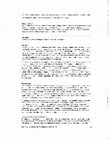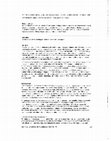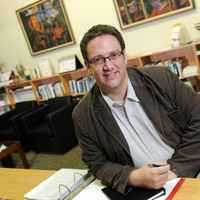Papers by Elizabeth A Loeffler
This is the fourth, and final, article in a series on threshold concepts featured in the scholarl... more This is the fourth, and final, article in a series on threshold concepts featured in the scholarly newsletter of the Gwenna Moss Centre for Teaching Effectiveness at the University of Saskatchewan, Bridges.

Threshold Concepts: From Personal Practice to Communities of Practice (eds. Catherine O'Mahony, Avril Buchanan, Mary O'Rourke and Bettie Higgs), Feb 2014
Considering the volume of recent scholarship on threshold concepts, including the volumes produce... more Considering the volume of recent scholarship on threshold concepts, including the volumes produced out of the previous three biennial threshold concept conferences, there has been relatively little exploration of threshold concepts in the humanities (Meyer and Land, 2006; Land, Meyer and Smith, 2008; Meyer, Land and Baillie, 2010). Perhaps, considering the label as ‘low consensus’ disciplines, this should not be surprising. Because of the variability in how individual academic staff in the humanities conceptualize their disciplines, and the preferred manner in which their disciplines are organized and taught over the course of a degree program, the ability to come to consensus (if such was required) on what is or is not a threshold concept can be difficult, if not impossible.
This paper explores some of the issues related to identifying threshold concepts in the humanities. We propose using the process of ‘decoding the disciplines,’ articulated by Middendorf and Pace (2004), to engage academic staff in the humanities in a conversation about bottlenecks experienced by students, how those bottlenecks are overcome by discipline specialists, and how we provide students opportunities to learn, practice and get feedback on the operations used by those disciplinary specialists to overcome those bottlenecks. In so doing, one particular case study, that of students’ difficulty understanding the ‘language’ of art in art history, is used to examine the ways in which decoding the disciplines can inform the identification of threshold concepts in the humanities, and the means by which we might adjust our curriculum development practices and pedagogical approaches to more effectively facilitate students’ passing of these thresholds.

Considering the volume of recent scholarship on threshold concepts, including the volumes produce... more Considering the volume of recent scholarship on threshold concepts, including the volumes produced out of the previous three biennial threshold concept conferences, there has been relatively little exploration of threshold concepts in the humanities (Meyer and Land, 2006; Land, Meyer, and Smith, 2008); Meyer, Land and Baillie, 2010). Perhaps considering the label as 'low consensus' disciplines, this should not be surprising. Because of the variability in how individual academic staff in the humanities conceptualize their disciplines, and the preferred manner in which their disciplines are organized and taught over the course of a degree program, the ability to come to consensus (if such was required) on what is or is not a threshold concept can be difficult, if not impossible. This paper explores some of the issues related to identifying threshold concepts in the humanities. We propose using the process of 'decoding the disciplines;, articulated by Middendorf and Pace (2...
Vol 11, no 1, 2012
This is the fourth, and final, article in a series on threshold concepts featured in the scholarl... more This is the fourth, and final, article in a series on threshold concepts featured in the scholarly newsletter of the Gwenna Moss Centre for Teaching Effectiveness at the University of Saskatchewan, Bridges.











Uploads
Papers by Elizabeth A Loeffler
This paper explores some of the issues related to identifying threshold concepts in the humanities. We propose using the process of ‘decoding the disciplines,’ articulated by Middendorf and Pace (2004), to engage academic staff in the humanities in a conversation about bottlenecks experienced by students, how those bottlenecks are overcome by discipline specialists, and how we provide students opportunities to learn, practice and get feedback on the operations used by those disciplinary specialists to overcome those bottlenecks. In so doing, one particular case study, that of students’ difficulty understanding the ‘language’ of art in art history, is used to examine the ways in which decoding the disciplines can inform the identification of threshold concepts in the humanities, and the means by which we might adjust our curriculum development practices and pedagogical approaches to more effectively facilitate students’ passing of these thresholds.
This paper explores some of the issues related to identifying threshold concepts in the humanities. We propose using the process of ‘decoding the disciplines,’ articulated by Middendorf and Pace (2004), to engage academic staff in the humanities in a conversation about bottlenecks experienced by students, how those bottlenecks are overcome by discipline specialists, and how we provide students opportunities to learn, practice and get feedback on the operations used by those disciplinary specialists to overcome those bottlenecks. In so doing, one particular case study, that of students’ difficulty understanding the ‘language’ of art in art history, is used to examine the ways in which decoding the disciplines can inform the identification of threshold concepts in the humanities, and the means by which we might adjust our curriculum development practices and pedagogical approaches to more effectively facilitate students’ passing of these thresholds.